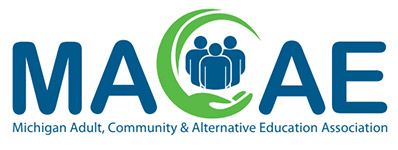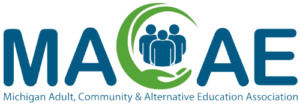Our Priorities and Pillars
MACAE serves as an advocacy organization to help promote the importance of adult, alternative, community education and integrated education and training across the state of Michigan. MACAE works to support local programs in their work and helps to highlights the intersection of education, community building and credentialing for program participants and their families.
You can see our 2023 Priorities here: 23-24 MACAE Legsilative Priorities
You can find ways in which to be an advocate by using our Legislative-Engagement-Timeline tool.
You can support adult education in five easy ways by using our 5 things in 5 weeks to support Adult Education, Family Literacy.
MACAE is proud of the diversity of its membership and program participants. Our core pillars are:
Early Care and Education
Research confirms that the most formative years of brain development occurs in a child’s first three to five years. Children who participate in high quality early childhood programs are more likely to succeed in school and be contributing members of society later in life. The best investment we can make is to ensure every child in Michigan gets off to a healthy, safe and enriching start.
Alternative Education
Michigan’s alternative education programs are capable, effective and efficient. We provide a needed service to the most difficult to serve to ensure that they are not left behind. We recognize the need for high academic achievement. However, we continue to advocate for flexibility in the access and delivery for students who need alternative ways to achieve and succeed. Alternative Education programs provide this opportunity for thousands of students across the state, ensuring that the rigor of our curriculum is achieved with student engagement, determination, and preparation for their next steps in learning and career pathways.
Adult Education
An estimated 1.7 million Michigan adults fall below a ninth-grade level for reading and math, disqualifying them from access to post-secondary education and job training. For these adults to be self-supporting, they must first have access to community-based adult education, literacy and ESL programs. Over the past 20 years, Michigan has continued to cut funding for programs that serve this population, while the need has skyrocketed due to fewer low-skilled, high paying manufacturing jobs and the increasing demand for a highly skilled workforce.
Career Technical Education
Supporting CTE programs is one way to upskill our current workforce and to prepare the workforce of the 21st century. This programming includes co enrollment in adult education programming to lead youth and adults to a high school equivalency or diploma in addition to an industry recognized certification.
MACAE Adult, Alternative, Community Education, Integrated Education and Training Principles Guide
Overview
Adult, Alternative, and Community Education in Michigan is focused on addressing the needs of hundreds of thousands of adult and families across the State to lead successful lives rooted in education, access and opportunity. Our programs provide and array of services including: numeracy, literacy, digital literacy, work readiness, soft skills, high school equivalency, child care services, integrated education and training, and numerous wrap-around services to more than 25,000 adult learners statewide.
In addition, these programs serve some of the most marginalized in our population in Michigan. The need for adult foundational skills building is so important, particularly in uncertain economic times to help adults achieve economic stability and educational and career success. Our programs with local employers and community partners to address the need for a highly educated and skilled workforce, particularly helping those without a high school credential or a clear path to postsecondary credential.
Key Points
Adult education, alternative education, community and workforce development partners can ensure that program participants have increased opportunities for success in the 21st century and are part of a pipeline to build a skilled workforce by:
- Bridging the Skills Gap by achieving educational outcomes for those at the foundational levels of learning
- Helping participants earn a High School Equivalency
- Increasing literacy for the lowest level adults in Michigan
- Bridging generational education loss
- Increasing access and equity to Digital Literacy Skills and online learning
- Increasing Employment and Economic Stability
- Enhancing the skilled workforce for in-demand, high need jobs
- Working with local workforce partners to create pathways
- Preparing for Higher Education, Training and Credentialing
- Working with local employers, workforce development partners and Michigan Works! to provide internships, apprenticeships, etc.
- Providing onsite education and career training
- Transitioning immigrants to the workforce
- Connecting Adults and Families with Needed Essential Services
- Connecting families to resources for affordable housing, transportation and childcare
- Helping youth and adults to navigate complex systems in healthcare, food assistance and case management
- Building Resilient Communities
- Increasing civic engagement and citizenship
- Providing flexible learning options that address basic needs of families
- Increasing parent involvement in their children’s education
Key Questions
How do we serve as a voice for all adult, alternative, community education and training partners across Michigan?
Adult, Alternative, and Community Education serves those most vulnerable in our community by equipping them with the educational skills, employability tools, and self-sufficiency resources necessary to lead successful and healthy lives.
How does adult education in Michigan operate?
Adult Education straddles two departments- the Michigan Department of Education and Department of Labor and Economic Opportunity. In an equitable system, this is meant to allow for the educational delivery of services to coincide with workforce training and development of an individual’s credentials as they prepare for their next step. While Adult Education provides the educational component of programming, it also relies on allies in the community (local nonprofits, educational entities, small business leaders) to help prepare participants for transition to postsecondary or credential and training opportunity.
How does this type of programming connect with other local, national and statewide educational initiatives?
Adult, alternative and community education programming supports generational family literacy. In Michigan this is important as it relates to the 3rd grade reading law. In addition, this type of programming directly correlates to statewide and national goals to have a proportionally higher number of youth and adult gain a high school credential, reducing high school drop-out rates and to have a more highly skilled workforce.
How do we strengthen the support of alternative education programming?
Alternative Education programs across the state partner with online digital learning vendors, local intermediate school districts and regional service agencies to address professionals in schools around discipline issues, homeless youth, foster youth, youth with diagnosed and undiagnosed behavior and other learning challenges, etc.
How can we continue to improve the system?
In order to build an equitable system, we would continually analyze the effectives of the regional delivery model of disbursement of adult education funds (section107) through regionals ISDs. We must continue to analyze how this impact has positively or negatively impacted the number or programs in existence across the state, the number of participants we have been able to serve year over year, and how funds are being allocated.
Additionally, to build an equitable system, we must continue to promote opportunities for education and training to be conducted concurrently. Also, we must continue to have discussions and evaluate how adult education and workforce development practitioners are working collaboratively together to address the needs of participants.
Who are the local, statewide or national partners that we engage with to support and extend the reach of adult, alternative and community education?
Adult, alternative, and community education programs are required to meet regularly with regional partners and local educational and workforce leaders. In addition, they participate in professional development and trainings offered through the Michigan Association of Community and Adult Education and the national organization, Coalition on Adult Basic Education.

